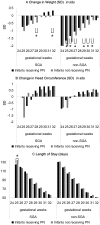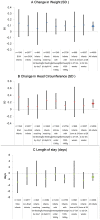Brief parenteral nutrition accelerates weight gain, head growth even in healthy VLBWs
- PMID: 24586323
- PMCID: PMC3929530
- DOI: 10.1371/journal.pone.0088392
Brief parenteral nutrition accelerates weight gain, head growth even in healthy VLBWs
Erratum in
-
Correction: Brief Parenteral Nutrition Accelerates Weight Gain, Head Growth Even in Healthy VLBWs.PLoS One. 2015 Nov 25;10(11):e0143984. doi: 10.1371/journal.pone.0143984. eCollection 2015. PLoS One. 2015. PMID: 26606139 Free PMC article. No abstract available.
Abstract
Introduction: Whether parenteral nutrition benefits growth of very low birth weight (VLBW) preterm infants in the setting of rapid enteral feeding advancement is unclear. Our aim was to examine this issue using data from Japan, where enteral feeding typically advances at a rapid rate.
Methods: We studied 4005 hospitalized VLBW, very preterm (23-32 weeks' gestation) infants who reached full enteral feeding (100 ml/kg/day) by day 14, from 75 institutions in the Neonatal Research Network Japan (2003-2007). Main outcomes were weight gain, head growth, and extra-uterine growth restriction (EUGR, measurement <10(th) percentile for postmenstrual age) at discharge.
Results: 40% of infants received parenteral nutrition. Adjusting for maternal, infant, and institutional characteristics, infants who received parenteral nutrition had greater weight gain [0.09 standard deviation (SD), 95% CI: 0.02, 0.16] and head growth (0.16 SD, 95% CI: 0.05, 0.28); lower odds of EUGR by head circumference (OR 0.66, 95% CI: 0.49, 0.88). No statistically significant difference was seen in the proportion of infants with EUGR at discharge. SGA infants and infants who took more than a week until full feeding had larger estimates.
Discussion: Even in infants who are able to establish enteral nutrition within 2 weeks, deprivation of parenteral nutrition in the first weeks of life could lead to under nutrition, but infants who reached full feeding within one week benefit least. It is important to predict which infants are likely or not likely to advance on enteral feedings within a week and balance enteral and parenteral nutrition for these infants.
Conflict of interest statement
Figures




References
-
- Ehrenkranz RA (2007) Early, aggressive nutritional management for very low birth weight infants: what is the evidence? Semin Perinatol 31: 48–55. - PubMed
-
- Denne SC, Poindexter BB (2007) Evidence supporting early nutritional support with parenteral amino acid infusion. Semin Perinatol 31: 56–60. - PubMed
-
- Kennedy KA, Tyson JE, Chamnanvanakij S (2000) Rapid versus slow rate of advancement of feedings for promoting growth and preventing necrotizing enterocolitis in parenterally fed low-birth-weight infants. Cochrane Database Syst Rev Cd001241. - PubMed
-
- Bombell S, McGuire W (2009) Early trophic feeding for very low birth weight infants. Cochrane Database Syst Rev Cd000504. - PubMed
-
- Ehrenkranz RA (2010) Early nutritional support and outcomes in ELBW infants. Early Hum Dev 86 Suppl 1: 21–25. - PubMed
Publication types
MeSH terms
LinkOut - more resources
Full Text Sources
Other Literature Sources

